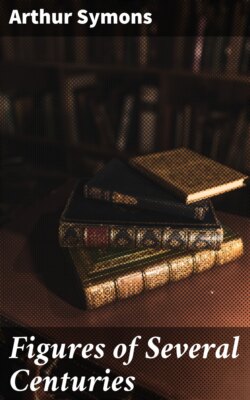Читать книгу Figures of Several Centuries - Symons Arthur - Страница 7
На сайте Литреса книга снята с продажи.
III
ОглавлениеTable of Contents
Beyond any writer pre-eminent for charm, Lamb had salt and sting. There is hardly a known grace or energy of prose which he has not somewhere exemplified; as often in his letters as in his essays; and always with something final about it. He is never more himself than when he says, briefly: 'Sentiment came in with Sterne, and was a child he had by Affectation'; but then he is also never more himself than when he expands and develops, as in this rendering of the hisses which damned his play in Drury Lane:
It was not a hiss neither, but a sort of a frantic yell, like a congregation of mad geese, with roaring something like bears, mows and mops like apes, sometimes snakes, that hissed me into madness. 'Twas like St. Anthony's temptations. Mercy on us, that God should give His favourite children, men, mouths to speak with, to discourse rationally, to promise smoothly, to flatter agreeably, to encourage warmly, to counsel wisely: to sing with, to drink with, and to kiss with: and that they should turn them into the mouths of adders, bears, wolves, hyenas, and whistle like tempests, and emit breath through them like distillations of aspic poison, to asperse and vilify the innocent labours of their fellow creatures who are desirous to please them!
Or it may be a cold in the head which starts the heroic agility of his tongue, and he writes a long letter without a full stop, which is as full of substance as one of his essays. His technique is so incredibly fine, he is such a Paganini of prose, that he can invent and reverse an idea of pyramidal wit, as in this burlesque of a singer: 'The shake, which most fine singers reserve for the close or cadence, by some unaccountable flexibility, or tremulousness of pipe, she carrieth quite through the composition; so that the time, to a common air or ballad, keeps double motion, like the earth—running the primary circuit of the tune, and still revolving upon its own axis'; and he can condense into six words the whole life-history and the soul's essential secret of Coleridge, when he says of him, in almost the last fragment of prose that he wrote, 'he had a hunger for eternity.'
To read Lamb makes a man more humane, more tolerant, more dainty; incites to every natural piety, strengthens reverence; while it clears his brain of whatever dull fumes may have lodged there, stirs up all his senses to wary alertness, and actually quickens his vitality, like high pure air. It is, in the familiar phrase, 'a liberal education'; but it is that finer education which sets free the spirit. His natural piety, in the full sense of the word, seems to me deeper and more sensitive than that of any other English writer. Kindness, in him, embraces mankind, not with the wide engulfing arms of philanthropy, but with an individual caress. He is almost the sufficient type of virtue, so far as virtue can ever be loved; for there is not a weakness in him which is not the bastard of some good quality, and not an error which had an unsocial origin. His jests add a new reverence to lovely and noble things, or light up an unsuspected 'soul of goodness in things evil.'
No man ever so loved his friends, or was so honest with them, or made such a religion of friendship. His character of Hazlitt in the 'Letter to Southey' is the finest piece of emotional prose which he ever wrote, and his pen is inspired whenever he speaks of Coleridge. 'Good people, as they are called,' he writes to Wordsworth, 'won't serve. I want individuals. I am made up of queer points and want so many answering needles.' He counts over his friends in public, like a child counting over his toys, when some one has offered an insult to one of them. He has delicacies and devotions towards his friends, so subtle and so noble that they make every man his friend. And, that love may deepen into awe, there is the tragic bond, that protecting love for his sister which was made up of so many strange components: pity for madness, sympathy with what came so close to him in it, as well as mental comradeship, and that paradox of his position, by which he supports that by which he is supported.
It is, then, this 'human, too human' creature, who comes so close to our hearts, whom we love and reverence, who is also, and above all, or at least in the last result, that great artist in prose, faultless in tact, flawless in technique, that great man of letters, to whom every lover of 'prose as a fine art' looks up with an admiration which may well become despair. What is it in this style, this way of putting things, so occasional, so variegated, so like his own harlequin in his 'ghastly vest of white patchwork,' 'the apparition of a dead rainbow'; what is it that gives to a style, which no man can analyse, its 'terseness, its jocular pathos, which makes one feel in laughter?' Those are his own words, not used of himself; but do they not do something to define what can, after all, never be explained?
